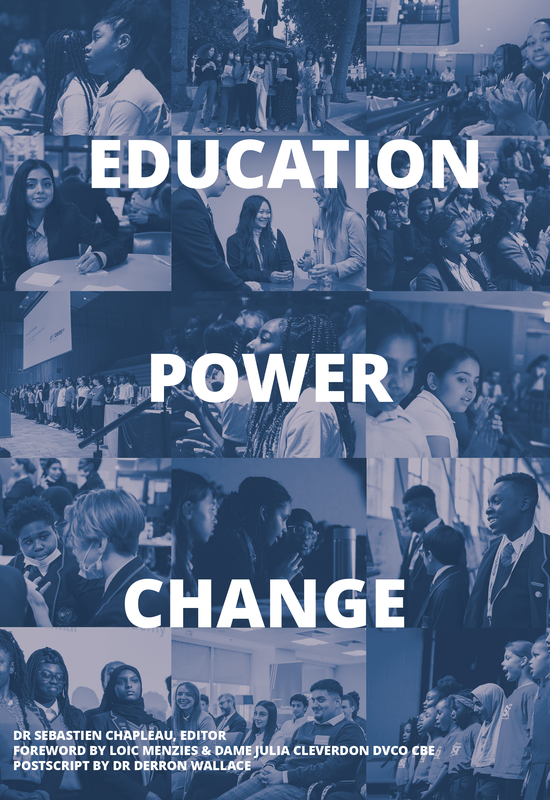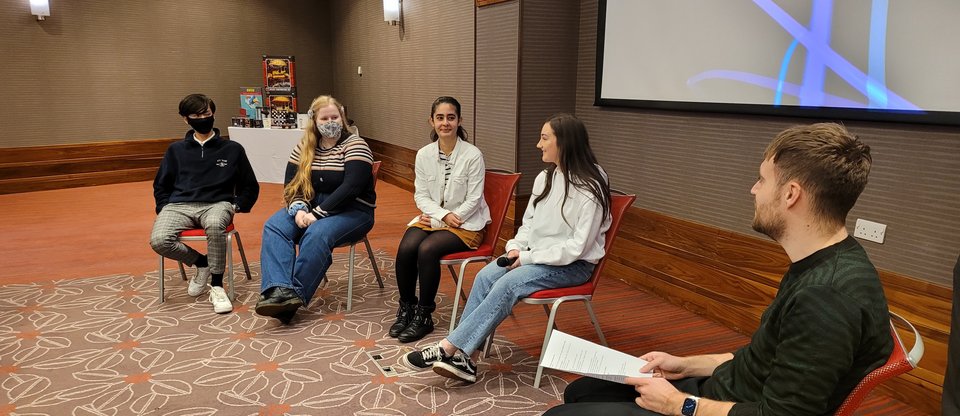St Mary's CE Primary School: Training for Lewisham Council
St Mary's CE Primary School: Training for Lewisham Council
- Hannah Gretton, Senior Community Organiser at Citizens UK
BACKGROUND
When Christine Bernard, headteacher at St Mary’s CE Primary School in Lewisham, reached out to Citizens UK in 2018, it was because of the challenge many of their pupils faced accessing citizenship. Their students, many of whom were blocked from citizenship due to the £1,012 associated cost, wrote poems about their situation and joined many other member schools outside the Home Office to take action on World Poetry Day. This started a powerful relationship between the school and Citizens, as St Mary’s became core members of the local alliance Lewisham Citizens, and played a strategic role in national campaigns. In 2019, the school became one of two pilot schools – the second being Surrey Square Primary School, in Southwark – to explore the intersection of parent organising and legal advice, as part of a partnership with Coram Children’s Legal Centre and Citizens UK funded through the Citizenship and Integration Initiative.
This piece tells the story of a campaign that emerged from that work, where a team of migrant parents took it upon themselves to challenge the hostile policies of Lewisham Council – and won.
LISTEN
Community Organising is a craft, or an art, rather than a science, but some of the practices to use this craft to make change and build people power (‘power with’) have followed very similar steps: starting with listening, before jumping to action
We call this ‘people before programme’. Why? Partly because if we don’t listen, we don’t know what is impacting people! So many well-meaning do gooders, particularly in the charity sector, try to make change on behalf of people thinking they understand those people’s interests better than them. Community Organising principles say that it is the people closest to the pain who are closest to the solutions. We might think that what a group of people want to campaign on is poverty, because we know they are in poverty and we know poverty is bad. But, actually, when we take the time to ask – and listen – we hear that, yes of course poverty is bad, but what they’d really like to campaign first on is the lack of lighting on their estate that makes them feel unsafe every single day. But even when we know what the issue is that people want to care on, we refuse to skip listening, because listening is how we build the relationships – and therefore the relational power, or ‘power with’ – needed to make change.
The staff at St Mary’s and the core parent team knew that immigration issues were dramatically impacting families, but we still needed to listen to find out what specific issues we could campaign on and who else could be involved. ‘People come to the meetings very closed, very kind of, ‘Oh, what’s all this about?’ and, literally, you can see people’s shoulders dropping after about 45 minutes. They realise, ‘Ah, people are going through the same experiences as me. It’s okay to talk about this’... It was trying to build up that trust and that rapport, really’ – Marta Tildesley, School Home Support Worker, St Mary’s CE Primary School
So as parents at St Mary’s listened to each other, through one-to-one conversations and sharing in group settings (known as ‘house meetings’, a term going back to Fred Ross as he organised migrant farm workers in California in the 1940s and 50s, where workers would meet in their homes in order to share stories and build momentum in the lead up to bigger gatherings). They asked a simple question: what would you like to change? And answers came in thick and fast, both specific and broad:
- Make the UK more welcoming
- Reduce Citizenship fees for children
- Cancel our NHS debt for giving birth
- Help my wife come to the UK
The most specific and tangible issue that came up, time and time again, from almost every parent that was spoken to, was how Lewisham Council staff treated parents when they came to them in need.
Parents told horror stories of going to the council with their children declaring homelessness and being told outrageously hostile and racist comments: ‘When I went to the council about a housing problem, I was told to go back to where I came from’ one parent said; ‘I was told if I can’t look after my children, maybe I shouldn’t have had children’, said another. School staff, organisers and Coram lawyers agreed, as they had seen this in practice when supporting families.
And as parents shared their stories one by one, their collective anger grew. They realised it wasn’t just them who had experienced this poor treatment, but it was a systemic issue at the core of the council that was impacting many more than just them.
Most importantly, they wanted to do something about it.
RESEARCH
The next step was to create a strategy. This is a group of parents who have never taken political action before, who are used to feeling powerless at the hands of decision-makers, so this stage was vital. The parents met with people from other organisations, like Lewisham Refugee and Migrant Network (LRMN), to find out what they knew about the council’s practices.
Clients using LRMN’s services had faced similar hostility, and this compounded the feeling that they needed to act. Parents also found out from them about the council’s recent commitment to become a Borough of Sanctuary. This was an opportunity, as it meant there would be people in the council working to shift things. Parents also needed to decide what they were asking for.
People who want to make change so often fail because they are asking for something broad (‘Make Poverty History’, ‘End Sexism’, etc.) but are not giving decision-makers something specific they can say YES – or NO – to. Parents decided that what would have a tangible impact on their experiences would be for the council staff they interact with to receive training to better understand where parents are coming from. And, alongside experts at Coram and Project 17, they wanted the training to be delivered by parents themselves.
Through more conversations, we found the people to target: Councillor Kevin Bonavia, cabinet member for Refugees, Accountability, and Democracy, who was leading on the Sanctuary commitment and had been a real ally in previous Lewisham Citizens campaigns, and Fergus Downy, overseeing the NRPF (No Recourse to Public Funds – for migrant families who can’t access other forms of state support) team in the council, who would need to be on board to implement the training.
ACT
The next step in the organising cycle is action. We act not for the sake of action but to get a reaction. Parents decided the reaction they wanted was a meeting with Councillor Kevin and Fergus, and so the first step was to get in touch with them, along with Lee who managed Fergus. ‘Let’s write a letter first, before we take bigger action, so they don’t think we’re being hostile…’ ‘Ok, but let’s make it really big, so big that they can’t say they didn’t see it’.
The parents collectively composed the giant letter. Within a few days of delivering the giant letter to the council building, Fergus had replied: ‘I accept your good intentions and very much appreciate you bringing this to my attention’. A date for a meeting was arranged. The team celebrated the positive reaction to their mini-action, and got preparing for the next step: negotiation.
NEGOTIATION
‘If you’re not at the table, you’re on the menu…’ The tables – real or metaphorical – around which decisions are made, are usually behind closed doors. Offices in Westminster or rooms in 10 Downing Street, board rooms, council halls, luxury golf courses… these are not places most of us have access to. But one of the chief aims of community organising is to get a seat at the table. We can run the best and most creative action in the world, we can have the strongest argument for the most just cause, we can be absolutely convinced we are on the right side of history, and if we do not have the power to get around the decision-makers’ tables, we are very unlikely to be able to influence their decisions
We can run the best and most creative action in the world, we can have the strongest argument for the most just cause, we can be absolutely convinced we are on the right side of history, and if we do not have the power to get around the decision-makers’ tables, we are very unlikely to be able to influence their decisions.
We practised the negotiation with the council four times before the real thing, with parents taking turns to play council staff and each other in a role play. Parents scripted their stories so they felt confident sharing them with Councillor Kevin. They wanted to be absolutely certain of what was committed to and what was not, so with the help of Ezra from Holy Trinity Church in Sydenham they created a checklist of their asks, once again giant-sized, so they could physically tick off each commitment Councillor Kevin made to them right in front of him. When the day arrived, parents led the meeting. They welcomed Councillor Kevin, acknowledged the brilliant work he had previously done with Lewisham Citizens on welcoming Syrian refugees to the borough, and acknowledged his commitment to making Lewisham a Borough of Sanctuary. Then they shared their stories.
“I’m not a praying person, but whenever I have to go to Lewisham council to get support for my kids, I go to church, get down on my hands and knees, and pray that they treat me like a human and not like an animal.”
Councillor Kevin was moved and ticked the box of every ask the parents made of him.
FOLLOW-UP
It took many more back-and-forths, and many delays due to the pandemic, but finally, in March 2021 the parents of St Mary’s, along with Citizens UK, Coram Children’s Legal Centre, LRMN and Project 17 delivered their training to a team of staff from the housing and NRPF teams at Lewisham Council, along with Fergus and the newly recruited Sanctuary Manager, Phil.
The highlight was the parents role playing real-life scenarios with council staff, in reversed roles, to give the staff a chance to experience the situation in the parents’ shoes, and for parents to share how it makes them feel.
We went from being powerless to those staff who have power over us, to having the power together to make them change their ways...
Parent leader
After we looked at how to approach the council (because many people who work for housing in the council can be very rude)... I think we can make changes because it’s not coming from just one person, it is coming from group of people saying the same thing…
Parent leader
This was one campaign win, and of a fairly-small scale. St Mary’s parents and staff have since been involved in winning the massive commitment to permanently extend Free School Meals and Pupil Premium to cover families with NRPF or no documents (up to 250,000 children across the UK) and the fee waiver introduced for children’s citizenship fees for children in care and children whose parents can’t afford the fees. But the work to develop a team of parent leaders, who are confident to act and build the power they need to make the change they want, has to go at their pace. Civil rights organiser Ella Baker talked about organising as ‘spade work’, the slow and patient tilling of the fields needed to prepare the ground for the next harvest. Each small action in a local campaign, each relational one-to-one conversation, each listening meeting, each moment a parent does something for the first time… is a preparation of the soil for the harvest that is to come. And with St Mary’s the work is only just beginning.
“Each small action in a local campaign, each relational one[1]to-one conversation, each listening meeting, each moment a parent does something for the first time… is a preparation of the soil for the harvest that is to come.”

Education Power Change
This is an extract from Education Power Change by Sebastien Chapleau.
Click below to download your free e-book and read more case studies on schools involved in Community Organising

Many schools (primary, secondary, and sixth form colleges) choose to be institutional members of Citizens UK. Their membership is an expression of their commitment to develop student leadership, as well as strengthen their links with families and neighbouring organisations. It is a way for them to address issues beyond the school gates, through Community Organising, as well as issues which have a direct impact on the wellbeing of their young people and families. Find out how your school can get involved below.





